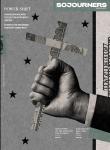THE PROPHETS ARE not the first biblical voices I turn to when hope is in short supply. Rather, reading them, I often think: Here we are again. Then as now, society and the world are barreling full speed toward devastation. Those in power put their faith in all the wrong places, followed by crowds of misguided people. Imagining how this will further unspool leads me to the edge of despair.
Yet, when I dug into the passages from the prophet Isaiah in this month’s readings, I found hope. If all were already lost, there would be no point to the prophet’s work. Instead, Isaiah proclaims that individual and social change are and continue to be possible — and then points the way, as Daniel Berrigan explains in his poetic commentary Isaiah: Spirit of Courage, Gift of Tears. “Just as despair is the ignoble stock-in-trade of the world’s systems,” Berrigan writes, “hope is the noble stock-in-trade of the prophet.” Isaiah’s exhortations are “skillfully laved in tenderness,” he writes. Isaiah sees what we see from the precipice, then holds out a hand to draw us back from it.
To draw back requires turning around. Rabbi Abraham Heschel writes that believing people to be capable of repentance “saved the prophets from despair. ... History is not a blind alley, and guilt is not an abyss. There is always a way that leads out of guilt: repentance, or turning to God.” Isaiah and the prophetic tradition remind us: Even though we’ve been here before — between disaster and consequences to come — God has been here, too.
January 5
Epiphany and Mulch
Isaiah 60:1-6; Psalm 72:1-7, 10-14; Ephesians 3:1-12; Matthew 2:1-12
AFTER FIERCE STORMS tore through our neighborhood, I rode my bicycle along streets strewn with broken tree limbs. An entire maple was split down its trunk. I felt the damage to these beloved trees in my own body. Last summer we endured drought and wildfire smoke; now, destructive storms. I spent the next several weeks menaced by climate despair.
Then a glint of hope flashed: I could care for and strengthen these trees, at least the ones around my house. I could help them withstand storms and summer droughts. From a Chicago community garden association, I’ve learned that mulching in a donut-shaped ring around trees promotes their health and survival. From those contacts, I received two free truckloads of mulch. With partners from a congregation around the corner, we dispersed mulch under two honey locusts next to the church building. And I spread mulch around the tree in front of our co-housing community’s two-flat. As I worked, neighbors got curious. I talked with those I knew and those I was meeting for the first time. With each conversation, the number of trees cared for on our city block grew, with corner plots for pollinator-friendly plants. A landlord lent me his wheelbarrow. A 4-year-old brought a packet of seeds to plant sunflowers in the pollinator patch. Tree by tree, neighbor by neighbor, my sense of hope continued to grow.
It’s easy to let Epiphany come and go. We remember the journey the Magi took with a luminous hope to guide them. This year, even as “the nations rage” and some “people plot in vain,” perhaps we can pair those familiar traditions with a search for what renewed hope looks like for us today. How is God’s light rising around us?
January 12
Love Letters
Isaiah 43:1-7; Psalm 29; Acts 8:14-17; Luke 3:15-22
MY FATHER WROTE by hand the opening verses of Isaiah 43 to send with me to Ethiopia when I was an 18-year-old studying and teaching abroad. These Bible verses were his way of telling me that whatever trying experiences I had, I would remain precious in God’s sight — and in his.Growing up in activist circles in the inner city of Washington, D.C., I was aware that the world could be a hard place. Yet, I was also sheltered. For example, I had not experienced the kind of patriarchy where a father is an unquestioned authority in a family, as I did in Ethiopia — not even in the homes of my grandparents, who were plain-dressing Mennonites. I also had to face hard truths about myself. I was, at times, an arrogant know-it-all. I needed more humility in cross-cultural settings. After the most intense moments, I pulled out the piece of paper from my father and read the words from Isaiah aloud: “Fear not, for I have redeemed you; I have called you by name” (43:1).
Though those words were received by a particular people more than 2,000 years ago, the second-person narration allows the verses to speak to anyone who is turning to this same God. We can imagine hearing from God: “You are precious, and I love you.” Throughout Isaiah, God is presented as having an anger at injustice that burns hot and as loving God’s people tenderly. This contrasts with some other literature of the time, with deities preoccupied with their own desires. Isaiah describes God as one who loves God’s people in their exile and in their return. God is mystery and beyond everything we can understand. God is also so close to us that we experience God’s unconditional love through those who love us best. Such love is what we need to continue growing through times of trial.
January 19
Holy Resilience
Isaiah 62:1-5; Psalm 36:5-10; 1 Corinthians 12:1-11; John 2:1-11
IN THE WAKE of devastating loss, one challenge is to avoid living each day braced for the next crisis. How do we enjoy the present and have hope for the future when suffering is raw, and we are afraid? In Holy Resilience: The Bible’s Traumatic Origins, David M. Carr writes that the Bible was shaped by people trying to make sense of their suffering. Scripture’s voices across millennia speak to us from a people’s intense self-examination prompted by catastrophe. In the ancient world, suffering was commonly understood as punishment for sin; a sign that people had been forsaken by God. The prophets led God’s people in critical collective examination. They believed God was punishing them. They wondered if God had abandoned them. The emerging field of trauma studies today teaches that a primary task for trauma survivors is to regain enough trust in the world to engage with others. Carr sees the words of comfort and hope in Isaiah as attempting to restore “the trust in God and the world that exile has undermined.”
Following on God’s words in previous chapters of comfort and restored trust, Isaiah 62 is tender. Now God speaks of promises made to a cherished people. The prophet extends the healing. Those who were called forsaken, who thought they were abandoned, now hear that God “delights” in them (verse 4). This people receives a new name from God, not an epithet of derision from those who mistreated them. Their identity is still as people of God. Carr writes, “The scriptures of Judaism and Christianity offer pictures of a God who is still present when life shatters to pieces.” There is life after catastrophe. Even in times of suffering, loss, and soul-shaking fear, the compassionate character of God is unchanged.
January 26
Jesus and Imagination
Nehemiah 8:1-10; Psalm 19; 1 Corinthians 12:12-31; Luke 4:14-21
In LUKE 4, we hear Jesus open his public ministry by reading aloud from the prophet Isaiah. But what was it like when Jesus-the-child or Jesus-the-teenager first heard the words of the Hebrew prophets? What went on in his mind as the prophetic messages commingled with his own growing sense of relationship with God and consciousness of his unique role in history? In his hometown synagogue in Nazareth, Jesus reminds the congregation that the words of God’s anointing were liberating to those who had the least in society. These words released hope among all who struggled, who couldn’t imagine that another way of living, another world, was possible. Jesus was not speaking only to the spiritual side of God’s grace. His words are part of a larger vision of liberation. Jesus’ words, Isaiah’s words, speak to a deeper kind of hope.
If we come to reading the prophets after our own dance with despair, then we are better positioned to find the hope God offers through them. In the second half of Isaiah, the prophet gives a sense of a new beginning to people in exile who thought there was none, writes scholar Walter Brueggemann in The Prophetic Imagination. As with those who heard Isaiah’s later prophecies, those energized by Jesus’ message also struggled to see a future where they would thrive. When Jesus aligns himself with Isaiah’s words of hope and promise — and with the whole of the prophetic tradition — he “brought to public expression the newness given by God,” writes Brueggemann. Jesus incarnates prophetic hope in a distinct way. Though the world around us at times looks bleak, we can look to the prophets and to Jesus. We can remember that there is still a larger vision — and we are part of it.

Got something to say about what you're reading? We value your feedback!







